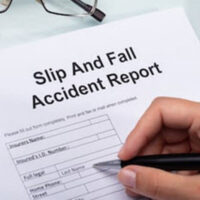Can I Sue For A Slip-And-Fall Accident?

Slip and fall accidents may not seem serious on their face, but they can cause permanent and lasting injuries that can seriously affect someone’s quality of life. While many people experience embarrassment after slipping and falling, and may try to walk it off or play down the pain for this reason, these injuries should never be taken lightly. Particularly as we move into summer time, and more time is being spent near pools with wet surfaces and with slip-and-slide type toys in places where you may not expect them, it’s helpful to understand both the risks associated with these types of injuries and your rights should you have the misfortune of suffering one.
Slip-and-Fall Injuries
Common slip-and-fall injuries can include broken bones, sprains, and pulled or torn ligaments. If an individual hits their head when they fall, they can suffer a traumatic brain injury, such as a concussion, internal hemorrhage, brain swelling, skull fracture, damage to their eye socket, nose, or teeth, and more. When head injuries like this occur by pools or water, it increases the risk of accidental drowning. Older individuals are at heightened risk for suffering broken or fractured hips and pelvic bones.
Causes of Slip-and-Fall Injuries
There is a wide range of possible causes for slip-and-fall injuries. While some may lie with the victim, such as tripping their own feet, many are often attributable to negligence on the part of the property owner. In this case, where some breach of ordinary care or negligence by the property owner resulted in an injury, the property owner can likely be held liable for the harm caused. Causes of this nature may include slippery or unmaintained surfaces (with no warning or attempt to mitigate the possible risk), debris or obstructions that create a risk, uneven surfaces (such as broken floor tiles, wobbly steps, loose carpet, or random holes and ditches which are not marked and which were not warned of, and broken equipment such as loose hand-rails or poorly maintained staircases.
When Can I Sue for a Slip-and-Fall Accident?
When you can sue for a slip-and-fall accident depends primarily on what duty the property-owner owed to you. For instance, if you slipped and fell while trespassing on someone’s property, they will not owe you the same duty as they would if you were a guest in their home or a patron in their store. In general, if you were invited on to the property (such as a house guest or store patron), the property owner owes you a general duty of ordinary care. This includes warning of known risks. This also includes a responsibility to investigate the property for possible dangerous conditions and taking precautions accordingly. In general, if there was a dangerous condition on the property that the property owner knew about or should have known about (i.e. it was obvious, had been present for a long time, etc.) and they did not warn you about the harm or take measures to try and protect you from it, you can likely sue them for the harm suffered.
Talk to a Georgia Personal Injury Lawyer
If you have suffered an injury as a result of a slip-and-fall accident in Georgia, the best thing you can do is contact a Cobb County personal injury attorney before the Georgia statute of limitations on your personal injury claim expires. Hawkins Spizman Trial Attorneys have helped victims of slip-and-falls accidents across Atlanta, Dunwoody, Alpharetta, Cobb County, Fulton County, Gwinnett County, Johns Creek, Sandy Springs, and all of Georgia get their lives back on track. Call today to schedule a free consultation and find out how they can help you too.
